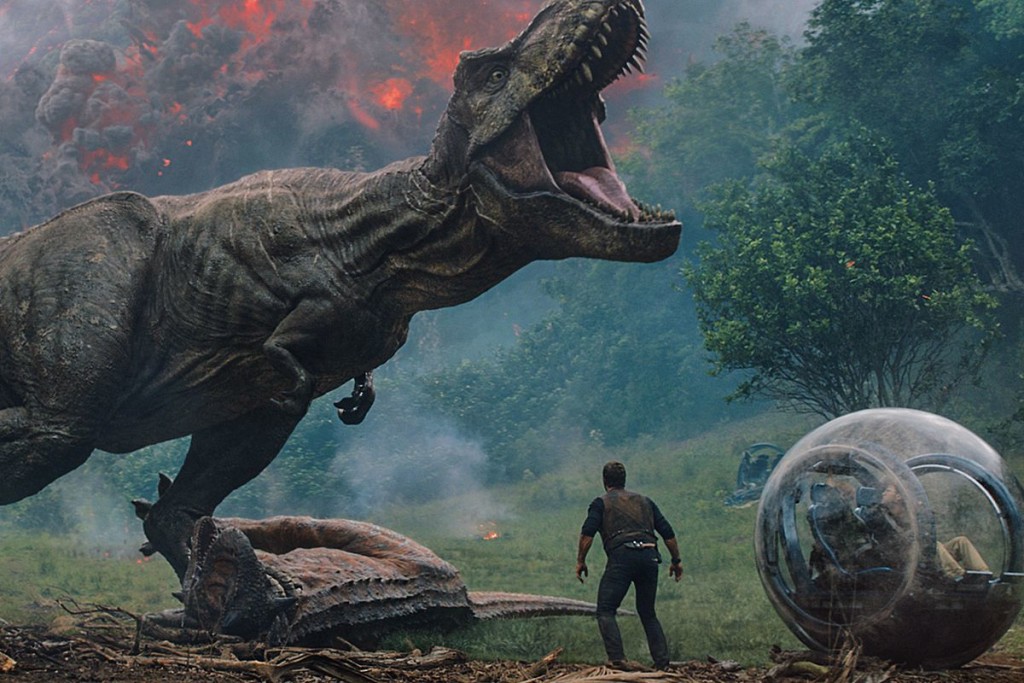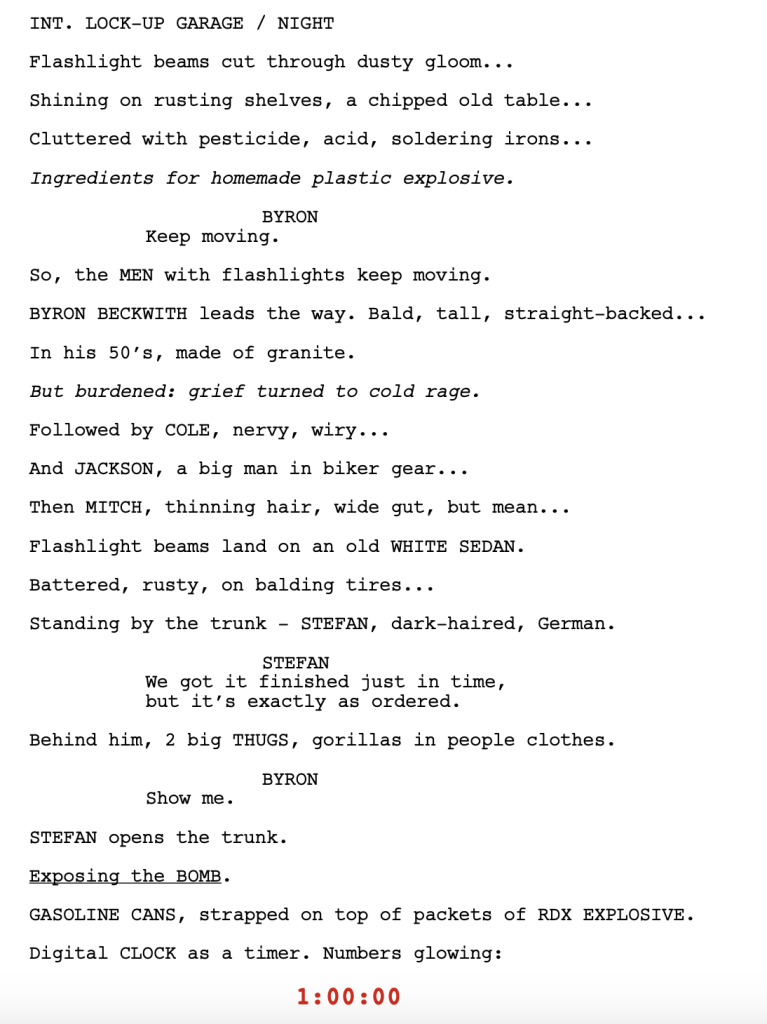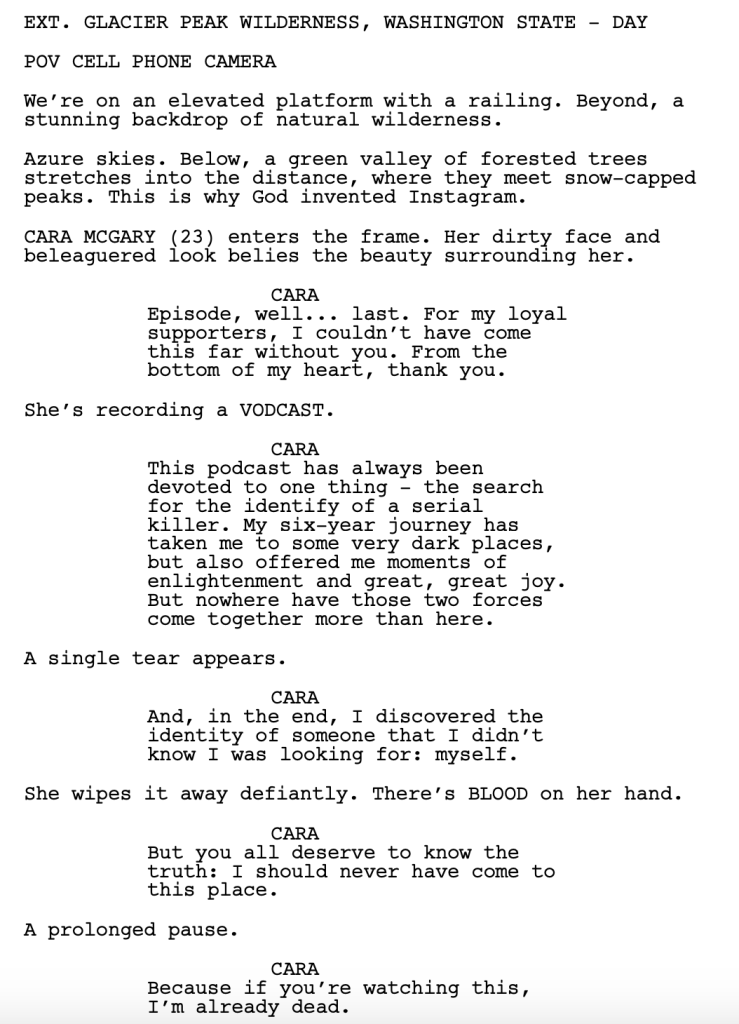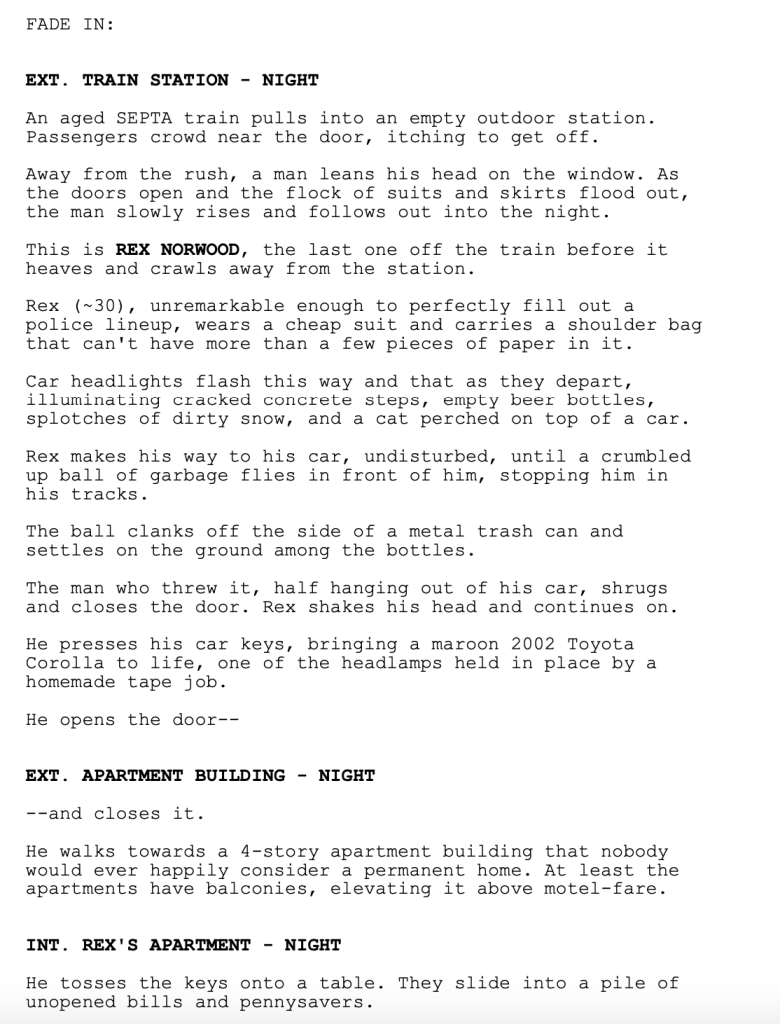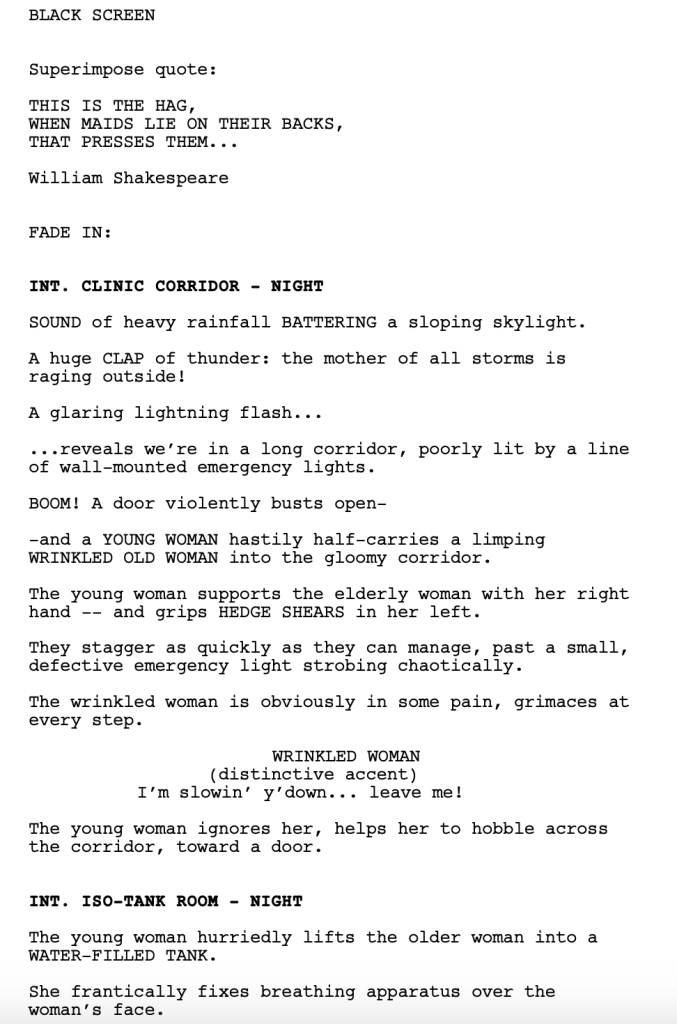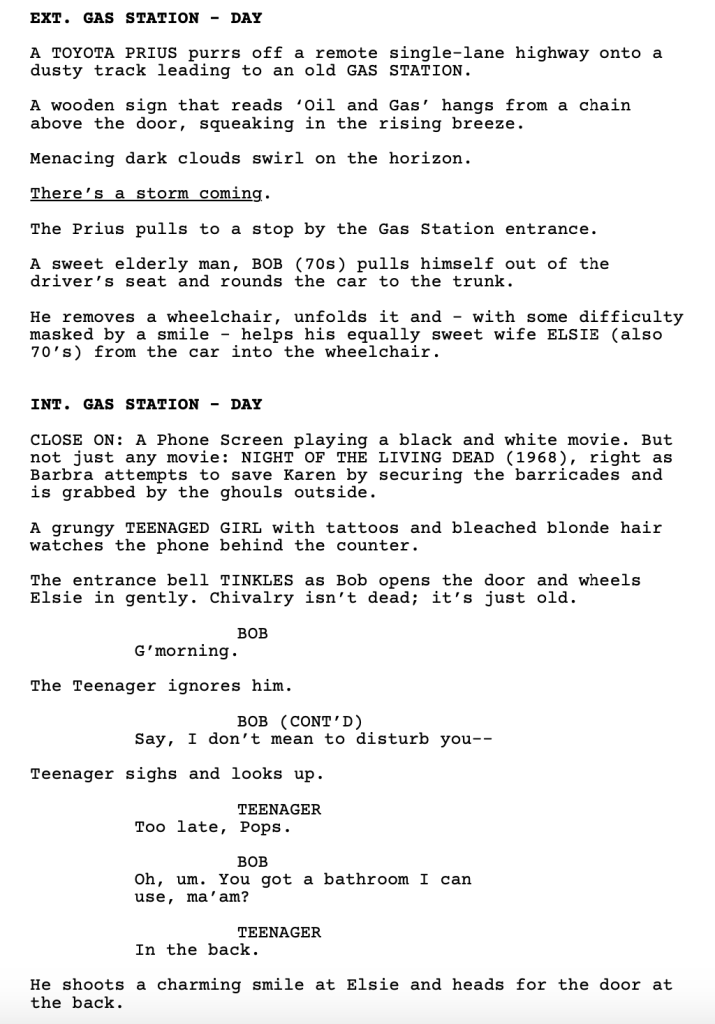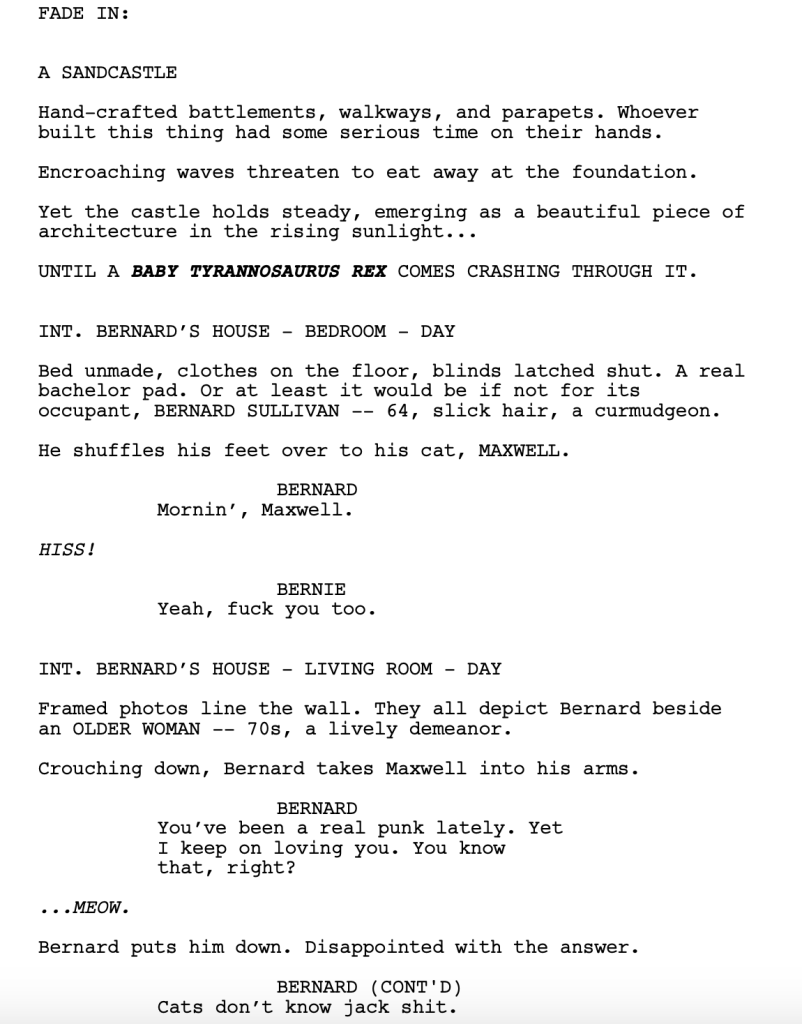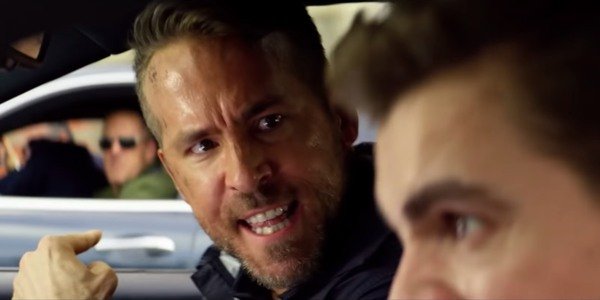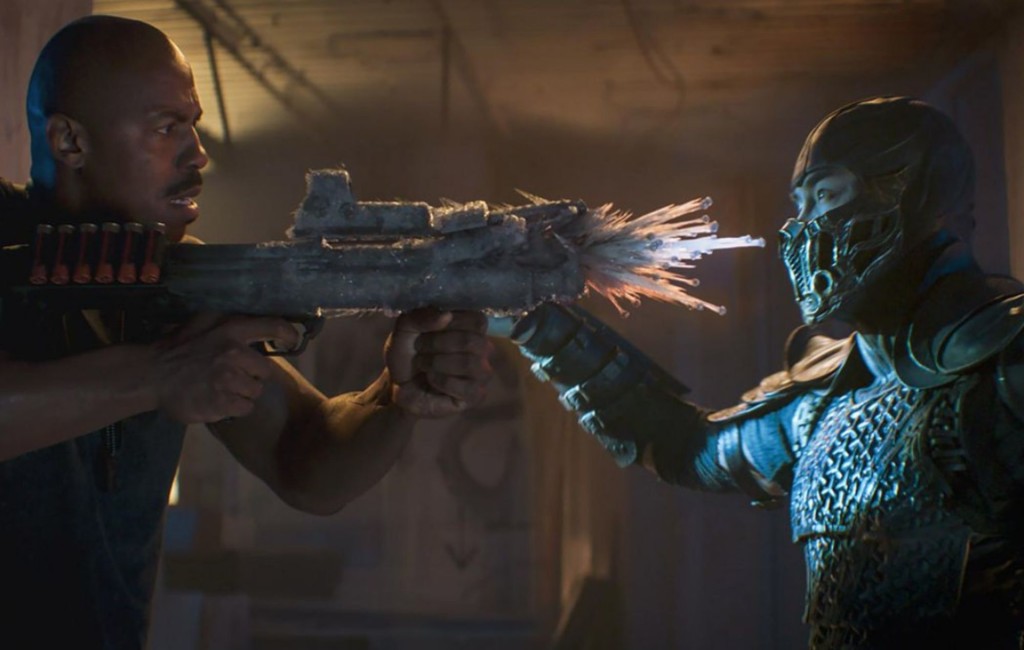Lots of possibilities for you and Scriptshadow Productions today so make sure to read the whole post!
CONGRATS TO MAELSTROM!
A big congrats to Stephen Parker, writer of Maelstrom. He won this weekend’s High Concept Showdown. Here’s his logline: “When a freak storm hits a couples therapy retreat and turns all men in its path into predatory killers, a devoted wife and her new female allies must fight to save their lives, as well as their relationships.”
Right away, I noticed people talking about and debating the logline in the comments. That’s typically a good sign. Even if people don’t love your idea, the fact that they’re talking about it means it’s connecting with them in some way. It’s caught their interest. And that’s half the battle. It’s HARD to get people to pay attention to anything in a world with more entertainment options than ever before. So, good for Stephen. I’m excited to read and review his script this Friday.
OSCULUM INFAME HAS A NEW DRAFT!
I have a new draft of Osculum Infame. For those who don’t know, Osculum Inflame is one of the most disturbing yet incredible scripts I’ve ever read. It was so disturbing, in fact, that I worked with the writer on a new draft. That draft is now here. However, I need to warn you once again, that if you’re not into graphic disturbing material, there is no need to query me about this script. Here’s the logline: “A young woman is about to be hanged in the middle of nowhere. She’s already tiptoeing with the rope tightened around her neck, when her executioner dies unexpectedly. So now she’s literally hanging on for dear life.” ‘Buried’ meets ‘The Revenant’.
Here’s what I’m going to do. If you want to read the script and share your thoughts with me, e-mail me at carsonreeves1@gmail.com and let me know that you can handle disturbing material. There is A CATCH to this. If I send you the script, I may call on you to read another script at a future date to give me notes on. If you’re cool with that arrangement, e-mail me!
And now, it’s time to announce the next Showdown. You’ve been whispering about it in the halls all weekend. Taking guesses. Making predictions. Well, now, I’m able to finally announce it. Our next showdown is…
COMEDY SHOWDOWN!!!
Holy Canoli, Carson. Comedy Showdown?? We haven’t focused on comedies for a long time on Scriptshadow. Where is this coming from? I’ll tell you EXACTLY where it’s coming from. EVERYBODY WANTS COMEDIES NOW.
The combination of a year-long pandemic and streamers loving the mid-budget comedy has resulted in a high demand for comedies everywhere you look. I have one producer who really wants family comedies (stuff in the vein of the upcoming “Yes Day” on Netflix). I have another producer who wants a “parents-centric” comedy. Parents have been locked up in their houses for a year with their kids. They’re itching to get out. A concept focused around them finally getting out and being free would be great. If you can nail one of those two scenarios, I can probably get your script sold quickly.
Some of my personal favorite comedies include: The Hangover, Bridesmaids, Happy Gilmore, Knocked Up, Meet The Parents, Borat, Step-Brothers, 40 Year Old Virgin, Tropic Thunder, Dude Where’s My Car, Superbad, School of Rock, What We Do In The Shadows, Office Space. The HOLY GRAIL COMEDY CONCEPT I’m personally looking for is the “next Ferris Bueller’s Day Off.” Something in the spirit of that movie but updated for 2021.
Here’s what I’m not looking for. I’m not looking for romantic comedies. I consider that its own genre. I’m not looking for dark comedy. I’m not looking for political comedies. I’m not looking for heavy satire. Even stuff like The Big Sick is too dramatic. I’m looking for the type of comedy that leaves you feeling good. That could still be R-rated comedy. Tropic Thunder was R-rated. But the idea here is to help people escape all the bullshit going on in the world for two hours. We want them to have fun.
In addition to holding a comedy showdown, I will also be helping you write it! But unlike before when I only gave you 2 weeks to write a script, this time you get 3 months. Plenty of time. Every Monday, I’m going to give you a list of things to do so that you stay on target. And because it’s comedy, I’ll be mixing in comedy-specific tips. Mostly, I’m going to help you structure out the three months so that you get the best script possible. Six weeks for the first draft. Four weeks for the rewrite. And two weeks for a polish.
And when do we start? RIGHT NOW!
Your week 1 goal is to come up with a concept. Your concept is EVERYTHING with a comedy. Unlike any other genre, people know immediately if a comedy script is going to work or not by reading the logline. If the logline doesn’t sound funny, there’s no point in opening the script. Never in the history of screenwriting has someone with an unfunny logline (or idea) written a funny screenplay. Which is why I’m giving you a full week to come up with one.
With comedy, you essentially have three avenues to pick from. You have your clever comedy premise (which usually involves irony), you have your common situation premise, and then you have your outrageous or ‘wacky’ premise.
The clever comedy premise has fallen out of favor recently but I believe it’s going to make a comeback. These concepts almost always involve irony. Happy Gilmore is about a hockey player who is forced to play golf. You have this big violent angry yelling sport contrasted against the ‘most polite’ sport in the world. That contrast creates irony which is what’s so funny about it. When you come up with a good ironic comedy premise, the script writes itself. Big, with Tom Hanks, was about a kid who turns into an adult and gets a VP job at a major toy company. That setup writes so many scenes for you.
Next up is the ‘common situation’ comedy which is probably the most popular of the options. This is when you take very common life experiences and build a comedy around them. Weddings. There’s a billion weddings. So somebody came up with Wedding Crashers. The stressful scenario of meeting your future in-laws (Meet the Parents). Getting someone pregnant (Knocked Up). These are a little tougher to write, in my opinion, because you have to use more imagination to come up with the plot. But, when done well, they’re obviously hilarious.
Finally, you have the outrageous comedies. Tropic Thunder is an example. The Hangover would squeeze in there as outrageous, I think. Zoolander, Ace Ventura, and Dumb and Dumber are a few more examples. You’ll notice these characters don’t exist in the same reality as you and I. They’re heightened versions of people. I tend to find that the wackier the characters are, the harder it is to keep the story believable. So you really have to be good at this type of comedy to write it.
Action comedies are also okay. But the concepts really have to be great because the movies cost so much more than a regular comedy.
In the end, I’m looking for CLEVER concepts. And your best tool to achieve that is irony. One of the reasons The 40 Year-Old Virgin came out of nowhere to be this monster hit was the irony in the concept. A 40 year-old man is “not supposed to be” a virgin. That’s what made it a fun idea. If you had written “The 25 Year-Old Virgin” nobody would’ve gone to the movie. A comedy titled, “Slutty Nun” is going to make a lot more money than a comedy titled, “The Polite Nun.” Irony is your best friend in comedy.
So, spend the next week coming up with as many funny ideas as you can. Take your top 5 and show them to five other people. Ask them if any of the ideas made them laugh. Whichever one gets the most laughs, that’s the one you’re going to write.
–I CAN’T STRESS THIS ENOUGH–
So many comedy screenwriters could’ve saved themselves YEARS of their life had they simply sent their comedy logline to five people to see if they thought it was funny. If none of those five people laughed, there is zero reason to write the script. One of the most inefficient things a writer can do is spend six months writing something only to THEN find out the idea isn’t funny.
BACK TO OUR REGULARLY SCHEDULED PROGRAM
That’s going to be a common theme throughout this process. In fact, if you’re on the fence about whether you can write a comedy script or not, team up with someone else here. Two minds are always funnier than one.
And with that begins… THE MARCH TO COMEDY SHOWDOWN!
What: Comedy Showdown
Genre: Comedy
When: Entries due Thursday, June 17, by 8 p.m. Pacific Time
How: Include title, genre, logline, why you think we should read it, and a PDF of your script.
Where: Send submissions to carsonreeves3@gmail.com
If you already have something, you can send it now!!!
Oh man, going through these loglines was equal parts awesome, frustrating, flabbergasting, and hilarious. One of my biggest laughs happened when I read this logline: “The search for a cure lands a doctor and her terminally ill husband alone on a boat, in a fight for their lives when the ‘super steroid pills’ intended for him are eaten by a plague of rabid, starving RATS.” For some reason, I misread “super steroid pills” as “sexual enhancement pills.” The movie I was imagining in that moment was unlike any movie I’ve seen before.
There were a ton of ‘ALMOST’ loglines. At their core, they were high concept. But something about the way they read indicated they weren’t quite where they needed to be. For example, here’s one that almost made it – “A disgraced bomb disposal expert struggles to escape the mind games of whoever trapped him inside a mascot suit and an explosive vest in New York Times Square.” I loved the irony of this setup. But I don’t know if this leans into the level of seriousness implied by the situation if our hero is in a mascot suit the whole time.
I want to thank everyone for submitting. I wanted to included every submission, of course, but there were only six slots (I had to add one more!) available. I’m sure many of you believe your concept is better than these. It very well might be. There’s always an element of subjectivity to this. For that reason, feel free to pitch your logline in the comments section. We’ll see if the other readers agree. Also, next Thursday, I’m doing a “Why Your Submission Didn’t Make It” article for five entries. If you would like your entry to be on that list, let me know in the comments. The goal of these articles is always to help the writer understand how to write better loglines and better submissions. So it’s very helpful.
If you have never played Amateur Showdown before, five scripts compete against each other below. Read as much of each script as possible and vote for your favorite in the comments. Votes close Sunday night at 11:59pm Pacific Time. The winner will get a review on the site next week.
Want to compete in a future Amateur Showdown? I have good news for you. I will be announcing the next Amateur Showdown Category MONDAY. So be ready for that!
And now, it’s time for the FIVE – MAKE THAT SIX! – CHOSEN ONES TO COMPETE.
Congratulations if you made the cut. And good luck to all!
Title: BLAST RADIUS
Genre: ACTION THRILLER
Logline: A desperate man fleeing a failed robbery carjacks an old Sedan and speeds away, only to realize he’s now driving a car bomb, and it’s ticking…
Why You Should Read: I’ve tried to write the ultimate GSU movie. I’ve written it in a VERY terse style, trying to tell the story with as few words as possible, so (I hope) the script will read as fast as the movie is designed to play.
Title: The Watchtower
Genre: Contained Thriller
Logline: An amateur true-crime podcaster takes a job manning an isolated fire watchtower in a remote wilderness area, where she’s convinced a series of recent disappearances is the work of a serial killer. Her investigation is turned upside down when she’s forced to take in an injured hiker – a man she suspects may be the killer she’s been obsessed with finding.
Why You Should Read: Big concept on a small budget. True-crime podcasters are the Clarice Starlings of today. And, in our pandemic world, thousands are heading to the great outdoors to find our “safe place”. Essentially a two-hander, this thriller is set in the unique world of fire-tower lookouts, otherwise known as “freaks on the peaks” – where the extreme isolation is known to bring out the best – and darkest – side of any personality. It’s a story about the duality of human nature.
In the wilderness, there’s no place to hide from yourself.
Title: Nine Lives, or The Infallible Guide to Extracting Revenge on Your Enemies
Genre: Dark Comedy/Drama
Logline: After getting hit in the head, a bipolar man starts collecting an army of cats at the behest of his dead childhood cat’s spirit to get revenge on those who’ve wronged him.
Why You Should Read: I know “high concept” is a bit nebulous for most, but in my mind, the main component that a high concept film needs is an elevator pitch that immediately marks it as something distinct, (even within its own genre) so people hear it and are compelled to see how things unfold for themselves. — My script doesn’t have any time travel or big reveals; it just takes an unusual but honest setup of a man and follows the path of the story, hopefully delivering a tight, well-contained character study with the backdrop of craziness (literally and figuratively) and several “did he really just do that?” type moments carrying it beyond a run-of-the-mill character piece.
Title: HAG
Genre: Horror
Logline: A woman suffering from night terrors seeks treatment at a sleep disorder clinic, only to discover that the shadowy creature tormenting her is real… and it will never stop until it steals away her breath.
Why You Should Read: Dealing with ‘Old Hag Syndrome’ (a state of paralysis where the sleeper awakens completely frozen but conscious, convinced a supernatural entity is sitting on their chest), this script introduces us to the Hag: a malevolent, body-distorting embodiment of nightmares that will surely go on to become a new movie monster franchise. The story mixes horror with psychological drama and creepy creature action. Set in a clinic on an island, featuring a small cast, this is a contained horror script that boasts a memorable, crowd-pleasing monster that will still be economical to shoot!
Title: MAELSTROM
Genre: Black Comedy/Thriller
Logline: When a freak storm hits a couples therapy retreat and turns all men in its path into predatory killers, a devoted wife and her new female allies must fight to save their lives, as well as their relationships.
Why You Should Read: MAELSTROM is a satirical contained thriller that takes the idea that the weather has the power to negatively affect our behaviour and amplifies it to 11. But what if we took it one step further still? What if it only affected male behaviour? And what if the affected men’s behaviour sorta, kinda, a teeny bit mirrored the behaviour displayed by asshole men the world over, resulting in a social commentary that explored themes of self-love and emotional independence in a battle royale of the sexes? Welcome… to MAELSTROM.
Title: Dinosaurs on the Beach
Genre: Comedy / Adventure
Logline: After discovering a living baby T-Rex, a failed paleontologist decides to evade the corrupt local authorities and raise the dinosaur himself. Jurassic Park meets E.T. the Extra-Terrestrial.
Why You Should Read: You like Jurassic Park. You like E.T. the Extra-Terrestrial. Why shouldn’t you read this?
I’m currently editing a screenplay, something I haven’t done in a while. And one of the things I’ve become obsessed with during the process is script rhythm. What is rhythm? Rhythm is the pacing of a script. It’s a combination of how long scenes last and how you balance longer and shorter scenes.
One of the things I’ve realized is that some general screenplay rules don’t mesh with the natural rhythm of a screenplay. For example, one of the first rules you’re taught, as a screenwriter, is that when you write a scene, you want to start the scene as late as possible and leave the scene as early as possible.
For example, if you had a job interview scene, and you were to utilize this advice, you would start in on the interviewer saying, “So tell me about yourself.” And we’re right into the meat of the scene. After they go through the applicant’s resume, the interviewer smiles and says, “We’ll be in touch.” END OF SCENE.
You’ve just written a technically perfect scene.
But is that the best scene you could’ve written?
Let’s imagine another scenario where the interviewer invites the applicant in, tells him to sit down, but before she starts the interview gets an important e-mail. “Hold on,” she says. “This will just be a second.” While the interviewer replies to this e-mail, we now get to sit in the applicant’s growing anxiety. He needs this job. And the longer he sits here, awkwardly, without saying anything, the more nervous he gets. And the more nervous he gets, the more he starts to sweat. And because he has to make sure he doesn’t LOOK nervous, he keeps trying to wipe the sweat off his forehead without the interviewer noticing.
Finally, she finishes, and because the applicant is so nervous, he starts babbling when asked questions. The writer doesn’t give our nervous applicant a way out though. He forces him to sit in those uncomfortable silences after he’s said something stupid. Eventually, things go so bad, he apologizes and asks if he can have a do-over. He’ll come back tomorrow. The interviewer offers a pinched smile and says, “I think we both know that won’t matter.”
Which is the better scene? I would argue the second scene is. Yet if we lived by the “start as late as possible, leave as early as possible” rule, we never would’ve written that scene.
Or take a look at the scene I broke down last week from I Care A Lot. That scene, which follows a lawyer trying to persuade a guardian to release one of her patients, didn’t start at the latest point either. There’s a bit of gamesmanship from the lawyer character before the real conversation gets started.
What we’ve learned? That some scenes need time to get the most out of them.
However, if you only write these types of scenes, your script can quickly begin to feel like it’s moving too slow. That’s because it’s harder to write long scenes and most writers don’t know how to construct them in the most dramatically compelling way. I recently read a party scene in a script that lasted 8 pages. There wasn’t any dramatic component to the scene at all. It was just us meeting characters. Even if a scene like that has a couple of nice moments, readers are going to get impatient.
It’s a reminder that, even though it wasn’t applicable in our interview scene or I Care A Lot scene, the “start as late as possible and leave as early as possible” tool is often the best option. You only want to bust out the really long scenes (8-10 pages) every once in a while.
Generally speaking, you want to write a few short (1 and a half pages) to medium (2 and a half pages) scenes, then a longer scene (3-5 pages), then a few more medium to short scenes, then a really long scene (8-10 pages), then some more shorter scenes. And so on and so forth. The appropriate balance of length is the key to getting the rhythm of a script right.
So what happens when you only write long scenes? Well, we actually have examples of that. This is how Quentin Tarantino writes a lot of his movies. I believe Pulp Fiction and Inglorious Basterds are one continuous series of 10 minute scenes. And, obviously, the movies work. So we’ve just proven your theory wrong, Carson. Rhythm is whatever scene-writing system you come up with.
Here’s the thing with Tarantino. He knows all the little dramatic tricks to keep your interest. He knows that when Nazi soldiers show up at a farmer’s house who’s hiding Jews, you’re going to want to see what happens. So his scenes are almost like mini-movies. They all have their own beginning, middle, and end. Therefore, when you go to a Tarantino movie, you’re watching a series of short films from a guy who understands storytelling better than 99.9999999% of Hollywood. In other words, he’s a bit of an anomaly.
If someone else were to write twelve 10-minute scenes for their movie – say, in yesterday’s Mortal Kombat script – people are going to be like, ‘What the f%$# is going on right now?’ The rhythm would seem all off.
Conversely, what happens when you only write short scenes? We actually have examples of this as well. Michael Bay lives by the rule of start the scene as late as possible and end it as early as possible. Go pop in 6 Underground on Netflix. Try to keep up with what’s happening in that movie. It’s impossible because the rhythm is so fast. It’s boom boom boom boom boom. We don’t have any time to breathe.
I bring this up because I realize that one of the main directives of screenwriting is to keep the story moving. Go go go all the time. And that gives screenwriters the wrong message. If all you’re doing is rushing along relentlessly, the reader never gets to sit down and learn about the characters, or understand and relate to what they’re going through. That’s what happened with Tuesday’s script, The Post Office, or whatever it was called. I found myself not caring because the plot was so relentless. The writer didn’t balance enough longer character-driven scenes with the 1 and a half page plot-driven scenes.
Rhythm is balance. It’s the ability to balance the long, the medium, and the short. As far as how many of each you’ll put in your script, that’s going to change depending on your genre and subject matter. For example, I just read a drama screenplay that followed a white trash family going through a rough spot in their life. In a script like that, you’re going to have a lot more longer scenes than short quick scenes. Conversely, in a script like Mortal Kombat, you’re going to have more short scenes than quick scenes.
What you’re looking to avoid is only relying on one. Or only relying on one specific page length for a scene. For example, if every scene in your script is exactly two pages, that’s going to feel weird. And the shorter your “default” scene length is, the weirder it’s going to feel. If you write 30 straight pages of 1 page scenes? People are going to throw your script down. Nobody can handle that. You need balance, a nice mix of short, medium, and long.
One of the biggest reasons for improper pacing is when writers start to trim scenes down to meet a certain page length. So, let’s say, they have 50 scenes in a 130 page screenplay. And they want to get it down to 120. What they’ll do is they’ll go into each individual scene and trim it. A 2 page scene becomes a 1 and a half page scene. A 3 page scene becomes a 2 and 1/4 page scene. And they do this again and again with all the scenes until the script hits that magical 120 page number, which makes them feel like they’ve accomplished something. But, in actuality, they’ve f$%#d up the rhythm of their screenplay because now everything is super short. What they should’ve done instead is eliminate scenes. That would’ve got them down to the page count without decimating all their individual scenes.
A good habit is to write down the length of every scene in your script in a spreadsheet and do a little investigating. If you have an endless number of ‘1 pagers’ I’m guessing your rhythm is off. Same deal if you have seven 10 page scenes and the final 40 pages are a bunch of short and medium scenes. That rhythm’s going to be off as well.
Rhythm is balance. Keep that in mind when you’re working your way through a script.
Genre: Action/Supernatural
Premise: Based on one of the most famous video games in history, an aging amateur boxer is called upon to fight in an ancient tournament that takes place in multiple dimensions.
About: Greg Russo, who has upwards of TWELVE projects in development, will call Mortal Kombat his first official produced credit. When asked about which characters he was going to use, this is what he said: “Yeah. One of the trickiest things I think with adapting the properties are there are so many characters, right? I mean there are, I think there are 70 something characters in this and we don’t have the ability to stagger these films like the MCU does, right? We can’t do a Sonya movie and then do a Liu Kang movie. So we’re forced right into Avengers mode off the bat. When that happens from a story perspective, you’re naturally going to have to juggle a lot of different characters and you’ll realize very soon that you only have so much room in, what’s hopefully Story One. Our mantra as the team behind this movie is always kind of, Movie One first, you know, let’s just make that great. Let’s not think about anything else.”
Writer: Greg Russo
Details: November 2018 draft
I’m drawn to the ‘straight-up soulless assignment’ side of the business because there’s this irony in that, as an unknown writer, your sole objective is to write a script that gets you inside the golden Hollywood gates. Yet once inside, your focus is on winning jobs like Mortal Kombat.
I think the general population assumes that for a movie like Mortal Kombat, you scrape the bottom of the barrel and go with any writer who knows how to spell at a 4th grade level. But that couldn’t be further from the truth. A screenwriting job like Mortal Kombat is coveted by almost everyone in the business. Writers would die to get an assignment like this.
However, once they get the job, reality sets in. You have this concept that doesn’t really make sense. And that’s because the mythology wasn’t built to be some thoughtful movie narrative. It just needed to make enough sense for a video game. Which means your job is taking this thin nonsensical silly world and create a story that’s actually good out of it.
In South Philly, we meet 30-something boxer, Cole Morino. The cool thing about Cole is that his cornerman is the youngest in the business, his 12 year old daughter, Emily. Well, maybe she’s not officially his cornerman. But she’s spirited and a good motivator. If his wife, Allison, who he’s separated from, found out he was allowing Emily anywhere near one of his fights, he’d be dunzos. But they haven’t gotten caught so far.
After Allison picks Emily up, some dude in a blue outfit in a mask that I’m pretty sure has nothing to do with a pandemic appears and starts making killer icicles rain down. The guy seems to have a beef with Cole but we don’t know why. A woman named Jade and an Aussie dude named Kano come to Cole’s rescue, rushing both him and his daughter away. Cole’s wife, unfortunately, doesn’t make it, turned into an icicle and then blown into a million pieces by Sub-Zero.
It’s here where we learn that a big fight tournament is coming up – Mortal Kombat – but the baddies want to kill off all the good guys beforehand so they don’t even have to bother with the tournament. Cheaters!
Once Cole and his new friends get some distance from Sub-Zero, we learn that Cole has a very rare medallion in his possession with a dragon’s head on it. The only people who have that, Jade explains, are mortal kombat warriors, the greatest fighters in the universe. Since Cole sucks at fighting, they deduce that it must have been his father’s, who Cole’s never met.
When they’re snuffed out again by the bad guys – this time by a dude named Reptile who, yes, has a lizard head – they barely kill him. Afterwards, Liu Kang, one of the greatest warriors on earth, arrives, and says we have to go to the great temple to talk to Raiden, who’s in charge of the Mortal Kombat Tournament.
Once at the temple, several baddies, including that pesky Sub-Zero, show up to fight them AGAIN. But this time Raiden, who’s a God, steps in, and offers a Mr. Miagi special: “Save it for the tournament in four days!” The bad guys reluctantly back off. But they’re not worried. The humans are so outmatched that they’re going to get slaughtered. And, once that happens, not only will Group Evil win the tournament, THEY’LL WIN EARTH!
The first thing I want you to look at here is how Russo structured his story. Because it’s actually quite clever.
Say you’ve been given the task of writing Mortal Kombat. What does everybody know about Mortal Kombat? There’s a tournament where all the fighters fight each other. So that’s obviously going to be your ending.
But what do you do in the meantime? What average-to-bad writers do is use all the lead-up to the tournament as setup. They’ve got a ton of characters to introduce so they’re going to utilize every one of those pages to set our tournament characters up one by one. Then, they bring all the good guys together. There’s probably a lot of conflict because everybody has a different opinion on how to do this. So we get a lot tough-guy banter. And then we get our tournament. The End.
Your screenplay will die if you take that approach.
Why?
Because setup is information. It’s not drama. It’s not entertainment – even if you sprinkle some fights in there. Without any engine pushing the characters forward, we’re just waiting around meeting people. I just encountered this in a script I read over the weekend. The first 30 pages was the writer conveying information without any drama.
So, what Russo does to kombat this is he creates this little storyline by which the bad guys, led by Sub-Zero, want to kill all of earth’s competitors before the tournament starts. Why wait for the tournament when you can take everyone out now? This initiates Sub-Zero to go after Cole and Sonya and Jax and Kano, which puts them on the run. Which means that we’re still meeting all of our characters, just like we would in the bad writer’s version, but we’re meeting them ON THE MOVE, AS THINGS ARE HAPPENING, IN THE MIDST OF DRAMA. Which is not only more exciting but required in a movie like this.
Let’s talk about another thing that pro writers understand.
The biggest problems that the Mortal Kombats of the world face is that they commonly lack soul. Without soul, a movie is a lifeless experience. It is eye-candy and nothing more. So how does one create soul within a movie?
The best way is through the main character. The main character is our vessel through which we experience the story. So if you can create a character who’s going through something universal that people can relate to, then we will feel a connection to them. There are other things you can do as well. But that’s your starting point.
Russo makes Cole our main character.
And Cole is in a situation that a lot of adults have either experienced or experienced something similar to. He and his wife are separated. They’re sharing custody of their child. It’s not easy. A part of each of them still wants to be together. But they don’t see eye to eye on big issues, such as what Cole wants to do with his profession. So we understand what Cole is feeling. Which means we have a connection with him.
Now, not everyone has their separated wife frozen and broken into a million pieces in front of their eyes. But loss is a universal experience. And since Russo did a good job of establishing this broken marriage and hinting at them fixing things, it hits us hard when she dies, and we want Cole to get revenge.
Something more specific to these types of assignments is you’re looking for the stand-out characters so you can feature them. When you play Mortal Kombat, it’s clear that Sub-Zero is a special character. There’s something unique and scary and badass and cool about him all at once. So Ross wisely made him the primary antagonist in the story. Don’t try to make weak characters from source material strong. Lean into the characters that already work. They’re your secret weapon.
Finally, just as a creative choice, I liked what Russo did with the human characters. He did a great job establishing how big of underdogs they were against the bad guys, who were all from different dimensions and had otherworldly powers. Cole couldn’t even beat up a 180 pound amateur boxer at the beginning of the movie. How is he going to defeat someone who can throw a freeze-spell at you, turning you into ice? Ditto with everyone else. Not only were they outmatched, but 9 tournaments have already been won. If the bad guys win this last tournament, earth is theirs. Talk about high stakes.
The only problem with Mortal Kombat is that it can’t escape its goofy mythological roots. I still don’t even know how it works. There’s different dimensions and the tournament is held on different planets in different dimensions all the time? Or something? If things would’ve been clearer, I might’ve upgraded my rating. But you can only give a script that contains a random monster with 4 arms so much screenplay cred. Which means Mortal Kombat skates by with a ‘worth the read.’
[ ] What the hell did I just read?
[ ] wasn’t for me
[x] worth the read
[ ] impressive
[ ] genius
What I learned: When you’re adapting something silly, it’s always a good idea to create a character that calls the silliness out. If Mortal Kombat takes itself too seriously, you’re going to lose your audience. Here, we have Jade explaining how Mortal Kombat works to both Cole and Kano: “They weren’t repeating stories they heard… they were reporting things they saw. That one shared myth was no myth. It was true. At various points in the past, Earth’s greatest champions went to war for mankind’s survival. An eternal war. To protect Earth from foreign enemies. The war was known as: (points to written symbol) Mortal Kombat.” Kano then pops in. “ Did you make that part up? (off Sonya’s look) It sounds like you made it up. Plus you spelled it wrong.” You gotta have some fun, man.
Genre: Action
Premise: Following in his murdered mother’s footsteps, Michael Griffiths enlists in the United States Postal Service… only to discover a mail route full of surprises and a job that means maybe, just maybe, saving the world.
About: This script finished with 11 votes on last year’s Black List. This writer is just getting started. He does have some Hollywood experience though, being Nicholas Stoller’s assistant on both Neighbors 2 and Storks. It looks like Amazon Studios may have purchased this to produce. It also appears to be an original spec. It isn’t based on anything that I know of.
Writer: Perry Jane
Details: 122 pages
Before I dive into this one – because I’m going to warn you in advance, it wasn’t for me – I want to say something positive. Which is that it was nice to see a big fun movie on the Black List for once. The Black List has become… I don’t know… weird. Some of the scripts that make the list defy explanation. So it’s cool that something your average moviegoer would pay for got on there.
Unfortunately, for script snobs like me, The U.S.P.S. was more “general postage rate” than “Express Mail.”
When word gets to 20-something security guard Michael that his mother died on her postal route, he’s already feeling guilty about not spending more time with her. But then Michael gets a security box key, and that’s where he learns that his mom was a lot more than your average postal worker. She was an agent who used her postal office cover to take down bad nasty people. His mother didn’t die. She was murdered!
Michael is quickly recruited by someone named Sinda, who knew his mother well. She takes Michael to a secret underground location where he’s instated as a trainee in the U.S.P.S. program – The United States Program of Spies!!!!! (“Neither snow nor rain nor gloom of night, nor threat of suffering and death, stays these agents from the swift completion of their mission.”)
Sinda believes that Michael’s mother was killed by a woman named Bonnie Jo Boone, who has just sent a message to the U.S. government that they have to give back 5 trillion dollars to be dispersed to all the poor people in the country that it was “stolen” from. Bonnie Jo works with six modified humans that are basically like, cyborgs, I guess. Translation: she’s serious.
Michael doesn’t get the gig right away, though. He has to try out against a bunch of other prospective spies. So he has to do things like sneak up to a house and deliver mail without anybody noticing.
When Bonnie Jo accelerates her plan, Sinda realizes they have to do the same. So Michael is promoted to a spy on a ‘probationary period.’ Michael is sent to a suspicious bank in the middle of Manhattan, where he discovers Bonnie and her team, waiting to rob it. The postal spies attack, which sends everyone on a crazy car chase through New York, complete with an old postal truck that transforms into a super-car-weapon-thing.
Bonnie Jo is able to get away. But Sinda learns something even worse. That Bonnie Jo is working with someone from the inside! They have a traitor in their midst! So off they go to the supposed traitor’s party (someone at the FBI) where they look for clues to take him down before Bonnie is able to commence her bank-draining plan that will move 5 trillion dollars out of the hands of the wealthy and into the hands of the people!
What is plot?
Plot is the sequence of events that push your primary story forward.
The spacing between these “plot beats” will dictate whether your script is designated as “plot heavy” or “plot light.” Smaller movies tend to have more spacing between their plot beats. Big Hollywood movies tend to have less. The reason is obvious. People who go to see a big Hollywood movie are expecting to be entertained consistently the whole way through. So you’ll see a lot of plot beats in Fast Furious, Iron Man 3, Star Wars.
Here’s the problem, though. If you erase all spacing between plot beats, your story loses its soul. If the only thing that is happening in your script is you’re racing your characters from one plot marker to the next, it’s hard for the viewer to connect with the characters. And that’s my problem with The U.S.P.S. It’s plot plot plot plot plot plot plot plot and plot.
Now the writer of The U.S.P.S. may argue that he does have some slower moments. We see Michael get drunk one night thinking about his mom’s death. I think there are a couple of more scenes like that throughout the script. Here’s the thing, though. You don’t get points for trying. For character-driven moments to resonate, you, the writer, have to care about them. If you’re just putting them in there because a screenwriting website told you to, or because you want to avoid someone giving you the note that you didn’t focus enough on character, they’re not going to work.
For character stuff to work, you have to be interested in the internal workings of your characters. You have to want to be exploring something with them that you’re just as curious about as your plot. One of the reasons the last two Avengers movies were so popular is because of Thanos. This is a guy who truly believed in what he was doing and had to make some horrible choices, including killing his own daughter, to succeed at his mission. There was something going on in that character. Something he was battling inside.
This is a major difference between the screenplays I read that are good and the ones that are bad. The good screenplays are almost always the ones where the writer is curious about the human condition with at least one of their characters. They want to know what makes a person tick, not how many ticks to the next plot twist. They’re interested in what it feels like to be Wade Wilson (Deadpool), who’s forced to stay away from the love of his life because he’s been burned beyond recognition and is ashamed of how he looks. They don’t care about the flashy Deadpool fight scenes. Well, they do, but they know those won’t work unless they get the character right.
And what’s so hard for writers – especially new writers – to understand, is that you can’t fake it. You can’t show a character looking sad remembering their dead parent if you haven’t sat down and thought about how that death has shaped them as a human being. Because it’s that shaping that’s going to come out in every scene they’re in. If you have to remind an audience that a character is affected by a traumatic event, you probably haven’t figured out who your character is yet. Characters LIVE those events.
Look, this script wasn’t bad. It’s like an American version of Kingsman. So if all you care about is eye entertainment, it might be fun. It’s a little out-there. A bit goofy for my taste. But it should make for an interesting movie.
I guess my issue is that U.S.P.S. felt like a writer who had 52 beats he had to stuff into a 120 page package and his mission, instead of writing something that explored the human condition in an entertaining way, was to make sure all 52 beats got in there through hell or high water. For that reason, the script couldn’t breathe. It was always about getting to the next checkpoint. And that’s why it wasn’t for me.
[ ] What the hell did I just read?
[x] wasn’t for me
[ ] worth the read
[ ] impressive
[ ] genius
What I learned: I want to talk about bolded underlined sluglines for a second because I see them being used occasionally, including here. One of the goals of a writer should be to make the reading experience as easy as possible. The more your eyes flow from left to right and down the page, the better. Bolded underlined sluglines create the effect of blockages on the page. That big ugly black line feels like something you have to burrow through or go around. If your script is light on locations (and therefore doesn’t have a lot of sluglines), this might not be a big deal. But if you’re switching locations a lot? If you’ve got 3 or 4 on a page? Those bolded sluglines can start to look like giant blockades in the middle of a street. It’s not pleasant. It’s something you should definitely think twice about.


